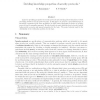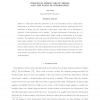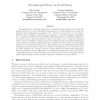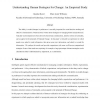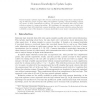TARK
2005
Springer
15 years 7 months ago
2005
Springer
119
click to vote
TARK
2005
Springer
15 years 7 months ago
2005
Springer
s for Multi-Agent Only Knowing (extended abstract) Arild Waaler1,2 and Bjørnar Solhaug3,4 1 Finnmark College, Norway 2 Dep. of Informatics, University of Oslo, Norway 3 SINTEF ICT...
102
click to vote
TARK
2005
Springer
15 years 7 months ago
2005
Springer
This paper addresses two closely related aspects of subjective information. First, no two agents necessarily see the same thing when they observe the same object. Second, no two a...
102
click to vote
TARK
2005
Springer
15 years 7 months ago
2005
Springer
Abstract This paper studies the interaction of error and information both in a single-person setting and in an interactive setting. In contrast to Blackwell’s Theorem, which says...
114
click to vote
TARK
2005
Springer
15 years 7 months ago
2005
Springer
: Two difficult issues for the logic of knowledge have been logical omniscience and common knowledge. Our existing logics of knowledge based on Kripke structures seem to justify lo...
TARK
2005
Springer
15 years 7 months ago
2005
Springer
113
click to vote
TARK
2005
Springer
15 years 7 months ago
2005
Springer
The aggregation of conflicting preferences is an important issue in human society and multiagent systems. Due to its universality, voting among a set of alternatives has a centra...
120
click to vote
TARK
2005
Springer
15 years 7 months ago
2005
Springer
The ability to model changes in preferences is crucially important for sound decision making and effective communication. Much has been written about strategies for changing belie...
107
click to vote
TARK
2005
Springer
15 years 7 months ago
2005
Springer
Current dynamic epistemic logics often become cumbersome and opaque when common knowledge is added for groups of agents. Still, postconditions regarding common knowledge express t...
107
click to vote
TARK
2005
Springer
15 years 7 months ago
2005
Springer
We analyze a model of interactive unawareness introduced by Heifetz, Meier and Schipper (HMS). We consider two axiomatizations for their model, which capture different notions of ...
